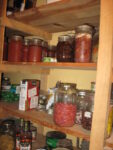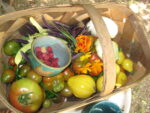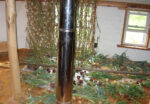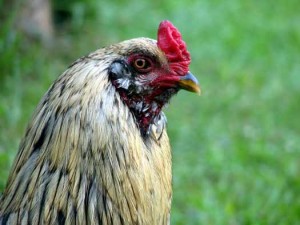- Like
- Digg
- Del
- Tumblr
- VKontakte
- Buffer
- Love This
- Odnoklassniki
- Meneame
- Blogger
- Amazon
- Yahoo Mail
- Gmail
- AOL
- Newsvine
- HackerNews
- Evernote
- MySpace
- Mail.ru
- Viadeo
- Line
- Comments
- Yummly
- SMS
- Viber
- Telegram
- Subscribe
- Skype
- Facebook Messenger
- Kakao
- LiveJournal
- Yammer
- Edgar
- Fintel
- Mix
- Instapaper
- Copy Link
A version of this column first ran in the Roane County (WV) Reporter and Times Record. Support local journalism! Subscribe to your local newspaper. This is one of a series of blogs for new gardeners. Start reading the whole series here: Part 1.
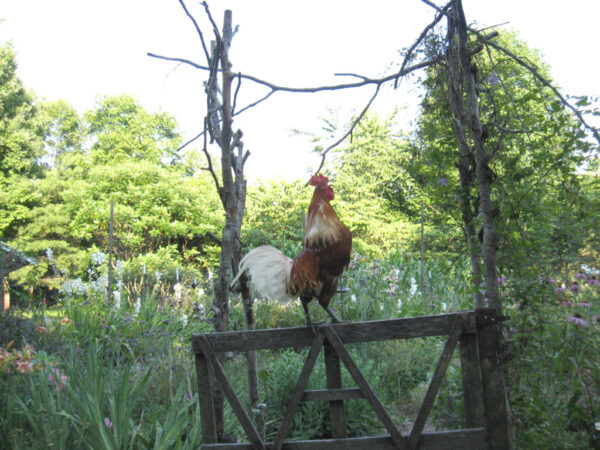 Yes, yes, this is supposed to be a garden column, but bear with me. There are good reasons for people with gardens to keep chickens. First of all, if putting a dent in your food budget and heaving healthier, fresher food for your family is a top reason for gardening, you can’t go wrong with eggs fresh from the hen. The difference in quality, compared to store-bought eggs, is immediately apparent; the yolks are a golden yellow, almost orange, not the pale yellow of eggs from imprisoned chickens. That is, if the chickens get to scratch in the sun and if they eat a fair amount of corn, the yolks are golden. The eggs are also much fresher. And this source of protein and omega-3 nutrients complements the vitamins from your garden.
Yes, yes, this is supposed to be a garden column, but bear with me. There are good reasons for people with gardens to keep chickens. First of all, if putting a dent in your food budget and heaving healthier, fresher food for your family is a top reason for gardening, you can’t go wrong with eggs fresh from the hen. The difference in quality, compared to store-bought eggs, is immediately apparent; the yolks are a golden yellow, almost orange, not the pale yellow of eggs from imprisoned chickens. That is, if the chickens get to scratch in the sun and if they eat a fair amount of corn, the yolks are golden. The eggs are also much fresher. And this source of protein and omega-3 nutrients complements the vitamins from your garden.
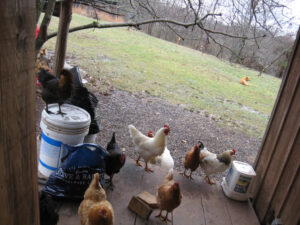
But eggs are not the only benefit. If you raise up chicks, you can eat the ones that turn out to be cockerels (you can even raise meat chickens but that’s a different matter, and I have no experience with it). Here again you’re getting meat that has not been raised on constant antibiotics, in horribly crowded conditions, usually in arrangements that turn farmers into serfs for the likes of corporations.
Then there’s the manure—a rich source of nutrients for your garden. It’s known as a “hot” manure, rich in nitrogen, which means it must be composted for six months before use. What I do is arrange for cleaning out my chicken coop to coincide with turning my main compost piles above the garden. I drag a tarp full of coop cleanings down, throw it on top of a layer of turned compost, then turn some more, and bring another tarp-full down. This way the manure works in with the rest of the compost, enriching it and helping it work faster.
Chicken manure can also be used on fruit trees and other bushes and trees, but rich fertilizer should not be used after about…now, because you don’t want to stimulate growth late in the year when the trees should be closing down for winter. July is okay, maybe August, after that don’t do it. But chickens can perform another service in your orchard; if allowed to run through it, they will eat up fruit drops, (so they can’t spread disease or bugs) and worms and bugs that can afflict your orchard. Unfortunately, they cannot perform such a service in your garden, as they feel compelled to kick around looking for bugs and will mess up your mulch and damage your plants. Some people run ducks in their garden; ducks don’t kick around like chickens but they consider a lot of green plants good food, so people restrict their garden access to certain times or areas). Another downside is that while chickens will eat many pest bugs, and can be good therefore near your garden—they consider earthworms the number one, most exquisite delicacy. And you don’t want a reduction in your earthworm population!
Chickens also generally relish garden rejects and kitchen scraps. This means they compete with your compost pile, but since their bedding feeds that pile, it’s all fair and good.
And then—part of the reason you have flowers in your garden is that you enjoy their beauty; part of the reason you garden is the pleasure of watching bugs, unearthing surprise toads in the spring, listening to birdsong. Right? Well, chickens are fun, and they make good yard ornaments. The chicks are so cute, scuttling in a fast little herd behind their mothers. And they provide endless fodder for conversation—even if one of my neighbors referred to my bulletins as “chicken gossip.” Small children find excitement in collecting eggs, and peeping at chicks.
Free range chickens can forage for a good part of their feed. The downside is predators, such a long list you won’t wonder where that phrase “tastes like chicken” comes from. A good dog is a big help here. I myself have half a good dog; she spends too much time at my neighbor’s, but when she’s here she runs off many a hawk casing the place, and has chased many a varmint down the hillside.
Read the rest: Part 1. Part 2. Part 3. Part 4. Part 5. Part 6. Part 7. Part 8. Part 9. Part 10. Part 11. Part 12. Part 13. Part 14. Part 15. Part 16.
